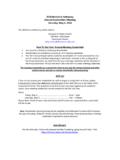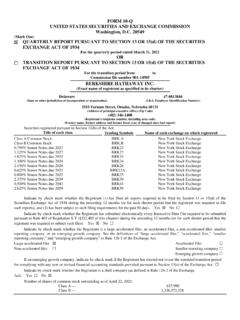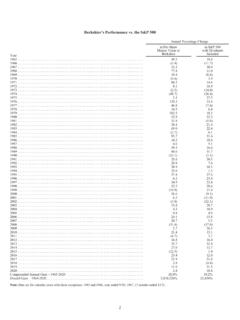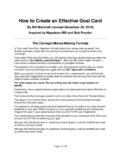Transcription of BERKSHIRE HATHAWAY INC.
1 REPORTBERKSHIRE HATHAWAY ANNUAL REPORTTABLE OF CONTENTSB erkshire s Performance vs. the S&P s Letter*..3-14 Form 10-K Business of Financial s s Report on Internal Auditor s Financial to Consolidated Financial Operating Meeting Transfer and Officers of the Back Cover*Copyright 2020 By Warren E. BuffettAll Rights Reserved1 BERKSHIRE s Performance vs. the S&P 500 Annual Percentage ChangeYearin Per-ShareMarket Value ofBerkshirein S&P 500with ( )( ) ( ) ( ) ( )( ) ( )( ) ( ) ( ) ( ) ( )( ) ( ) ( ) ( ) ( )( ) ( )( ) ( ) ( ) ( ) Annual Gain Gain ,744,062%19,784%Note:Data are for calendar years with these exceptions: 1965 and 1966, year ended 9/30; 1967, 15 months ended 12 HATHAWAY the Shareholders of BERKSHIRE HATHAWAY Inc.: BERKSHIRE earned $ billion in 2019 according to generally accepted accounting principles (commonlycalled GAAP ). The components of that figure are $24 billion of operating earnings, $ billion of realized capitalgains and a $ billion gain from an increase in the amount of netunrealizedcapital gains that exist in the stockswe hold.
2 Each of those components of earnings is stated on an after-tax $ billion gain requires comment. It resulted from a new GAAP rule, imposed in 2018, that requiresa company holding equity securities to include in earnings the net change in theunrealizedgains and losses of thosesecurities. As we stated in last year s letter, neither Charlie Munger, my partner in managing BERKSHIRE , nor I agreewith that adoption of the rule by the accounting profession, in fact, was a monumental shift in its own 2018, GAAP insisted with an exception for companies whose business was to trade securities thatunrealizedgainswithin a portfolio of stocks wereneverto be included in earnings and unrealizedlosseswere to beincludedonlyif they were deemed other than temporary. Now, BERKSHIRE must enshrine in each quarter s bottomline a key item of news for many investors, analysts and commentators every up and down movement of the stocksit owns, however capricious those fluctuations may s 2018 and 2019 years glaringly illustrate the argument we have with the new rule.
3 In 2018, a downyear for the stock market, our net unrealized gainsdecreasedby $ billion, and we therefore reported GAAP earnings of only $4 billion. In 2019,risingstock prices increased net unrealized gains by the aforementioned $ , pushing GAAP earnings to the $ billion reported at the beginning of this letter. Those market gyrationsled to a crazy 1,900% increase in GAAP earnings!Meanwhile, in what we might call the real world, as opposed to accounting-land, BERKSHIRE s equity holdingsaveraged about $200 billion during the two years, and theintrinsic valueof the stocks we own grew steadily andsubstantially throughout the and I urge you to focus on operating earnings which were little changed in 2019 and to ignoreboth quarterly and annual gains or losses from investments, whether these are realized or advising thatin no waydiminishes the importance of these investments to BERKSHIRE . Over time, Charlieand I expect our equity holdings as a group to delivermajorgains, albeit in an unpredictable and highly irregularmanner.
4 To see why we are optimistic, move on to the next Power of Retained EarningsIn 1924, Edgar Lawrence Smith, an obscure economist and financial advisor, wroteCommon Stocks as LongTerm Investments, a slim book that changed the investment world. Indeed, writing the book changed Smith himself,forcing him to reassess his own investment in, he planned to argue that stocks would perform better than bonds during inflationary periods andthat bonds would deliver superior returns during deflationary times. That seemed sensible enough. But Smith was infor a book began, therefore, with a confession: These studies are the record of a failure the failure of factsto sustain a preconceived theory. Luckily for investors, that failure led Smith to think more deeply about how stocksshould be the crux of Smith s insight, I will quote an early reviewer of his book, none other than John MaynardKeynes: I have kept until last what is perhaps Mr. Smith s most important, and is certainly his most novel, industrial companies do not, as a rule, distribute to the shareholders the whole of their earned good years, if not in all years, they retain a part of their profits and put them back into the business.
5 Thusthere isan element of compound interest(Keynes italics) operating in favour of a sound industrial investment. Over a periodof years, the real value of the property of a sound industrial is increasing at compound interest, quite apart from thedividends paid out to the shareholders. And with that sprinkling of holy water, Smith was no longer s difficult to understand why retained earnings were unappreciated by investors before Smith s book waspublished. After all, it was no secret that mind-boggling wealth had earlier been amassed by such titans as Carnegie,Rockefeller and Ford, all of whom had retained a huge portion of their business earnings to fund growth and produceever-greater profits. Throughout America, also, there had long been small-time capitalists who became rich followingthe same , when business ownership was sliced into small pieces stocks buyers in the pre-Smithyears usually thought of their shares as a short-term gamble on market movements. Even at their best, stocks wereconsidered investors were slow to wise up, the math of retaining and reinvesting earnings is now wellunderstood.
6 Today, school children learn what Keynes termed novel : combining savings with compound interestworks wonders.**At BERKSHIRE , Charlie and I have long focused on using retained earnings advantageously. Sometimes thisjob has been easy at other times, more than difficult, particularly when we began working with huge and ever-growing sums of our deployment of the funds we retain, we first seek to invest in the many and diverse businesses wealready own. During the past decade, BERKSHIRE s depreciation charges have aggregated $65 billion whereas thecompany sinternalinvestments in property, plant and equipment have totaled $121 billion. Reinvestment inproductive operational assets will forever remain our top addition, we constantly seek to buy new businesses that meet three criteria. First, they must earn goodreturns on the net tangible capital required in their operation. Second, they must be run by able and honest , they must be available at a sensible we spot such businesses, our preference would be to buy 100% of them.
7 But the opportunities to makemajor acquisitions possessing our required attributes are rare. Far more often, a fickle stock market serves upopportunities for us to buy large,but non-controlling, positions in publicly-traded companies that meet our way we go controlled companies or only a major stake by way of the stock market BERKSHIRE sfinancial results from the commitment will in large part be determined by the future earnings of the business we havepurchased. Nonetheless, there is between the two investment approaches a hugely important accounting difference,essential for you to our controlled companies, (defined as those in which BERKSHIRE owns more than 50% of the shares), theearnings of each business flow directly into the operating earnings that we report to you. What you see is what the non-controlled companies, in which we own marketable stocks,onlythe dividends that Berkshirereceives are recorded in the operating earnings we report. The retained earnings?
8 They re working hard and creatingmuch added value, butnotin a way that deposits those gains directly into BERKSHIRE s reported almost all major companies other than BERKSHIRE , investors wouldnotfind what we ll call this non-recognition of earnings important. For us, however, it is a standout omission, of a magnitude that we lay out for , we list our 10 largest stock-market holdings of businesses. The list distinguishes between their earningsthat are reported to you under GAAP accounting these are the dividends BERKSHIRE receives from those 10 investees and our share, so to speak, of the earnings the investees retain and put to work. Normally, those companies useretained earnings to expand their business and increase its efficiency. Or sometimes they use those funds to repurchasesignificant portions of their own stock, an act that enlarges BERKSHIRE s share of the company s future s Share (in millions)CompanyDividends(1)Retained Earnings(2)American $ 261$ ,519 Bank of ,167 Bank of New York Morgan $3,798$8,332(1) Based on current annual rate.
9 (2) Based on 2019 earnings minus common and preferred dividends , the realized gains we will eventually record from partially owning each of these companies willnot neatly correspond to our share of their retained earnings. Sometimes, alas, retentions produce nothing. But bothlogic and our past experience indicate that from thegroupwe will realize capital gains at least equal to and probablybetter than the earnings of ours that they retained. (When we sell shares and realize gains, we will pay income tax onthe gain at whatever rate then prevails. Currently, the federal rate is 21%.)It is certain that BERKSHIRE s rewards from these 10 companies, as well as those from our many other equityholdings, will manifest themselves in a highly irregular manner. Periodically, there will be losses, sometimescompany-specific, sometimes linked to stock-market swoons. At other times last year was one of those our gainwill be outsized. Overall, the retained earnings of our investees are certain to be ofmajorimportance in the growth ofBerkshire s Smith got it OperationsTom Murphy, a valued director of BERKSHIRE and an all-time great among business managers, long ago gaveme some important advice about acquisitions: To achieve a reputation as a good manager, just be sure you buy goodbusinesses.
10 Over the years BERKSHIRE has acquired many dozens of companies, all of which I initially regarded as goodbusinesses. Some, however, proved disappointing; more than a few were outright disasters. A reasonable number, onthe other hand, have exceeded my reviewing my uneven record, I ve concluded that acquisitions are similar to marriage: They start, of course,with a joyful wedding but then reality tends to diverge from pre-nuptial expectations. Sometimes, wonderfully, thenew union delivers bliss beyond either party s hopes. In other cases, disillusionment is swift. Applying those imagesto corporate acquisitions, I d have to say it is usually the buyer who encounters unpleasant surprises. It s easy to getdreamy-eyed during corporate that analogy, I would say that our marital record remains largely acceptable, with all parties happywith the decisions they made long ago. Some of our tie-ups have been positively idyllic. A meaningful number,however, have caused me all too quickly to wonder what I was thinking when I , the fallout from many of my errors has been reduced by a characteristic shared by mostbusinesses that disappoint: As the years pass, the poor business tends to stagnate, thereupon entering a state in whichits operations require an ever-smallerpercentageof BERKSHIRE s capital.



















